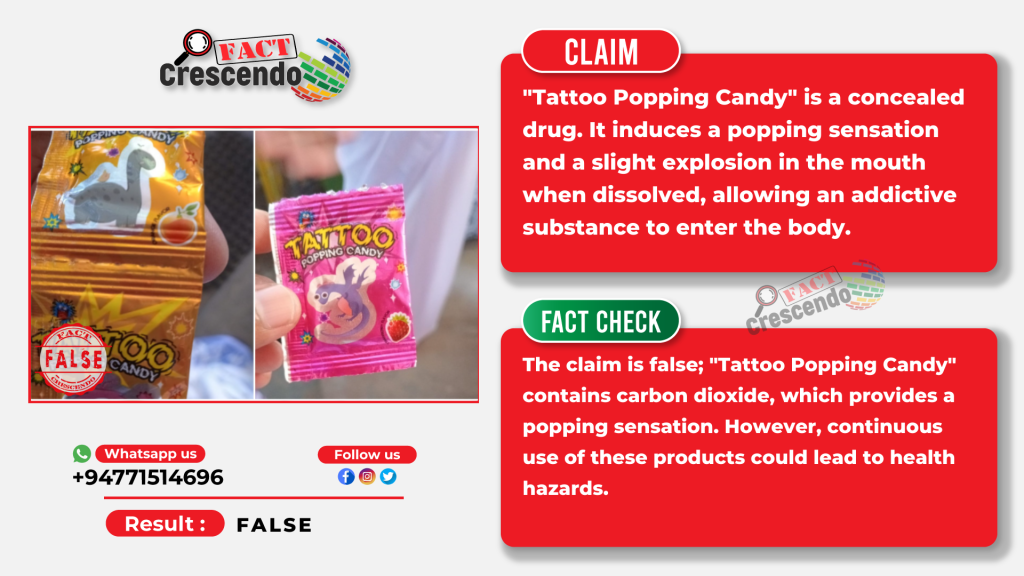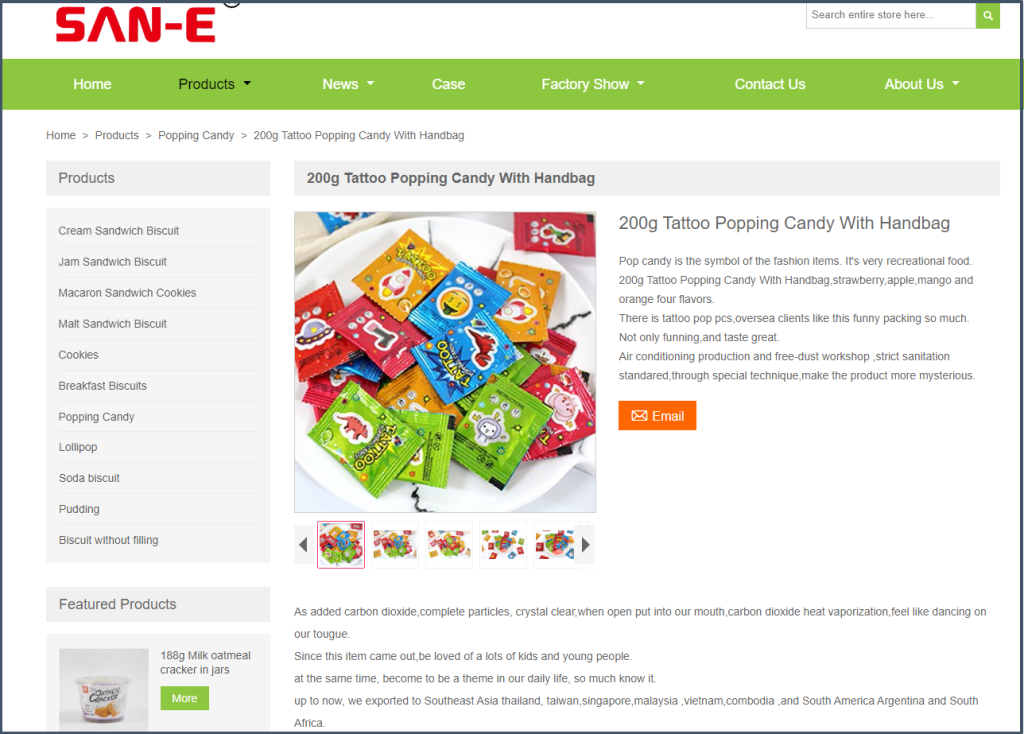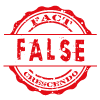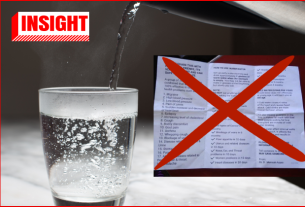
One of the strategies adopted by drug dealers to lure young clientele is mixing substances with over-the-counter pain remedies and other familiar products, at times even candy products. As a result, once in a while, viral advisory messages get shared about the detrimental effects of certain candy products.
But how many such claims are really related to drugs, and how many are exaggerations with little or no factual basis? We validated viral claims on a candy brand called “Tattoo Popping Candy”, which was said to contain addictive substances and is not suitable for children.
Social Media Claims :
A WhatsApp message is making rounds, alleging that the candy brand “Tattoo Popping Candy” is a concealed drug. When dissolved, it was claimed to induce a popping sensation and a slight explosion in the mouth, allowing an addictive substance to enter the body. The candy is supposedly sold in small alleys in Sri Lanka. Parents are urged to stay alert and prevent their children from consuming it.

You can listen to the audio in Sinhala below.
Moreover, we also found this claim on Youtube.
We’ve received numerous requests inquiring about the accuracy of this information. In response, we’ve taken measures to verify the facts.
Fact-Check:
The absence of information regarding the specific school and area where the candy was discovered in the previous message led us to conduct a reverse image search on the photos of the alleged drug-laced candy.
According to their official website, Guangdong Shangyi Food Co., Ltd. is a production-oriented enterprise specialising in Biscuits, Candy, jerky, Preserved Fruit, Nuts, etc. Moreover, the aforementioned product is exported to various countries within Southeast Asia, including Thailand, Taiwan, Singapore, Malaysia, Vietnam, Cambodia, South America, Argentina, and South Africa, as indicated on the official website.

According to their website, their products undergo quality testing in accredited centres. They boast a team of skilled professionals and technical experts, including professional nutritionists who serve as technical advisors. This information can be found here.
Furthermore, presented below are the certificates of business license and Halal Certification of the said company, which has been operational since 2014.

Nevertheless, we investigated whether there were any documented incidents of this establishment selling products laced with drugs, but we found no such reports in mainstream media.
We have contacted the company for clarification regarding this product and aim to update this article with their response.
National Dangerous Drugs Control Board in Sri Lanka
Speaking to the Factcrescendo Sri Lanka team, the director of the National Narcotics Laboratory of the National Dangerous Drugs Control Board in Sri Lanka stated that similar claims of candy products with popping sensations containing addictive substances were shared a few years ago as well. The director confirmed that such products were tested in his laboratory then, and it was found that particular popping candy products did not include any addictive substances. The current claim appears to be made on the same lines and could be confirmed after a lab test.
At the same time, the director explained that while these products might not contain addictive substances, continuous use of these types of popping candy brands could have health hazards. These ill effects include high sugar levels that can contribute to dental cavities and may impact caloric intake. At the same time, artificial colours and flavours raise concerns over potential hypersensitivity reactions and long-term health effects.
Also, the media spokesman for the National Dangerous Drugs Control Board in Sri Lanka, the Consumer Affairs Authority and the Police media spokesman stated that they had not received any complaints about this popping candy being used as an addictive drug substance propagation method.
Another manufacturing company importing Popping Candy/ Pop Rocks in Sri Lanka
Upon inquiry with a company importing popping candy in Sri Lanka, they stated that they had not received any complaints regarding the Popping Candy.
How does popping candy work?
Dr Emma Davies, a science writer and editor with a PhD in food chemistry from the University of Leeds, stated that Popping candy is made by heating the sugars sucrose, lactose, and corn syrup (plus some flavouring) to boiling point. Carbon dioxide (CO2) is bubbled through the molten mixture at a pressure of around 600 pounds per square inch (psi)—several times the pressure in a champagne bottle.
What causes that popping sensation?
Precise recipes vary from brand to brand, but popping candy is typically a mixture of several different types of sugar and tiny pressurised bubbles of a gas, usually carbon dioxide. For this reason, it’s also referred to as ‘gasified candy’ in some patent applications.
The gas is added to melted sugar at a high pressure – at least two or three times typical air pressure at sea level, and sometimes much higher. With the right combination of temperature and pressure, the sugar forms small crystals, each containing several gas bubbles roughly a tenth to a fifth of a millimetre in diameter.
Sugar dissolves in water, so when the candy makes contact with your tongue, the water in your saliva breaks up these bubbles. The pressurised gas escapes, sometimes with enough force to crack the rest of the candy crystal. This is what causes the tingling, popping sensation.
Both the bubbles and the crystals are very small, so the amount of force involved in these cracks is unlikely to cause any problems. But in a small amount of bad news, at least one lab-based study has found that popping candy can have an effect on tooth enamel.
If you want to watch gasified candy pop but are concerned about your teeth, you can add it to plain water instead – this will also set it off.
Incorporating narcotic drugs into foodstuffs
Numerous incidents worldwide have been reported where drugs have been found in various food items, particularly candies aimed at children. This explains the reasons why significant concerns are raised within society about little-known candy types.
If there are suspicions regarding the presence of drugs in the aforementioned product, they should have been reported to the relevant authorities by now. Yet, these institutions have confirmed that no complaints have been filed thus far.
In cases where a product is suspected of containing drugs, it can undergo laboratory testing by the National Dangerous Drugs Control Board under the Ministry of Defense, which operates for this purpose in the country. It is essential to inform the relevant institutions responsibly first upon receiving such information rather than spreading unverified claims through social media channels. This helps prevent false advertisers from achieving their objectives of selling potentially harmful products.
Read this report in Sinhala : පාසල් අවට මත්ද්රව්ය ඇතුළත් ටොෆියක් ඇති බවට පළ වූ WhatsApp පණිවිඩයේ ඇත්ත කතාව!
Read similar articles :
- ට්රැමඩෝල් Pencil Candy පිළිබඳ මත්ද්රව්ය නාශක අංශවලින් අනතුරු ඇඟවීමක්!
- මත්ද්රව්ය ඇතුළත් ලොසින්ජර පිළිබඳ පළ වූ WhatsApp පණිවිඩය පිළිබඳ ඔබ දැනුවත් ද?
- ළමුන් අඩපණ කරන මත්පෙති සමඟ ලංකාවේ වෙළඳපොළේ අලෙවිවෙන Luppo කේක් ? (Video)
Follow us and stay up to date with our latest fact checks.
Facebook | Twitter | Instagram | Google News | TikTok | WhatsApp
Conclusion:
The social media claim that “Tattoo Popping Candy” contains addictive substances is misleading. In truth, this candy is sold in many countries and has been certified by multiple worldwide organisations. Its popping sensation when dissolving in the mouth is due to the carbon dioxide gas it contains.

Title:Does “Tattoo Popping Candy” Contain Addictive Substances? Find out the facts…
Written By: Pavithra SandamaliResult: False






